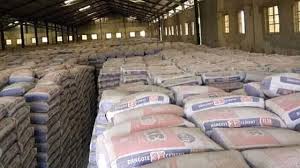To address the escalating prices of cement across Nigeria, the Joint Committee of the House of Representatives has called on major cement producers to provide detailed documentation on their production costs.
The move aims to ascertain the fairness of current market prices, which have surged to over N10,000 in various parts of the country. The public hearing, held over the weekend in Abuja, saw the committee scrutinizing the financial records and production data of leading cement companies, including Dangote Cement Company and Lafarge Africa PLC.
The Chairman of the Joint Committee, Jonathan Gaza, emphasized the necessity for cement producers to disclose their average daily consumption of essential materials such as coal, gas, gypsum, limestone, clay, and laterite, along with their daily production outputs from 2020 to date. Furthermore, the companies are required to detail both imported and local components used in cement production, including their prices in naira and dollars.
Gaza highlighted that the committee’s inquiry covers various aspects of the companies’ operations, including the prices and quantities of cement produced monthly since 2019, audited accounts, bills of lading, customs duties paid, and any tax waivers or incentives received. The lawmaker stressed that this comprehensive data is crucial to justify the current high prices of cement and to identify potential areas for price reduction.
During the hearing, Dangote Cement’s Group Managing Director, Mr Arvind Pathack, explained that a significant portion of their production costs—up to 95 per cent—are either imported or tied to foreign exchange (forex). Pathack cited a drastic increase in the prices of key inputs such as gas, diesel (AGO), gypsum, imported coal, spare parts, new trucks, tyres, and petrol, ranging from 100 per cent to 333 per cent.
He noted that some contracts for accessing gas and explosives are denominated in dollars, compelling the company to engage in international sales and source forex from the parallel market due to insufficient provisions from the Central Bank of Nigeria (CBN).
Pathack also highlighted logistical challenges, such as the poor state of key roads, which result in longer delivery times and higher truck maintenance costs. Additionally, the lack of sufficient forex to settle trade obligations has led to substantial forex losses, amounting to N150bn annually, while the company pays a 30 per cent interest rate on loans. He further pointed out that the devaluation of the naira, insecurity, and unreliable public power supply have exacerbated production costs.
Despite these challenges, Pathack maintained that the price of cement in Nigeria, when converted to dollars, remains one of the lowest in Africa, at $4.43 per bag, compared to $7.8 in Benin, $6.6 in Togo, $7.8 in Ghana, and $4.4 in India. He attributed the inflated retail prices, which can exceed N10,000 per bag, to middlemen over whom the company has no control. Pathack claimed that cement is sold at an average factory price of N7,200, suggesting that the discrepancy in retail prices is due to the actions of retailers.
The committee’s move to scrutinize cement pricing has received mixed reactions. Critics argue that the lawmakers’ intervention could be seen as overreach, potentially disrupting market dynamics and leading to unintended consequences. They contend that market prices are influenced by a complex interplay of factors, including production costs, supply chain inefficiencies, and macroeconomic conditions. Interfering with these mechanisms might lead to short-term price reductions but could harm the industry’s long-term sustainability and investment climate.
Moreover, critics highlight the inefficacy of previous government interventions in controlling prices, arguing that such measures often fail to address the root causes of inflation and may lead to supply shortages. They caution that imposing stringent regulations on cement producers could discourage investment and innovation, ultimately harming consumers by reducing the availability and quality of cement.
Conversely, supporters of the committee’s action argue that the extraordinary profits reported by cement companies—such as Dangote Cement’s N524bn in 2022, N553bn in 2023, and N166.4bn so far in 2024—indicate that there is room for price adjustments without compromising profitability. They contend that the high prices of cement have a significant impact on construction costs and, by extension, housing affordability and infrastructure development. Ensuring fair pricing is thus seen as a matter of public interest, essential for economic stability and social equity.
Rep. Dabo Ismail, a member of the committee, emphasized that despite sourcing most raw materials locally, companies like Dangote Cement continue to post increasing profits, raising questions about the justification for ongoing price hikes. He argued that consumers should not bear the brunt of inflated prices while producers reap substantial financial gains.
In his remarks, Gaza criticized the Federal Competition and Consumer Protection Commission (FCCPC) for its inaction in curbing price inflation and protecting consumers. He accused the FCCPC of failing to regulate middlemen who sell cement at exorbitant prices, exacerbating the burden on Nigerians.
The House Committee’s investigation into cement pricing represents a critical effort to balance industry profitability with consumer protection. While the move has sparked debate, it underscores the need for a comprehensive approach to addressing price inflation, ensuring that economic policies foster both business growth and public welfare. As the investigation progresses, the outcomes will likely shape the future of cement pricing and regulatory practices in Nigeria, with significant implications for the construction industry and the broader economy.


